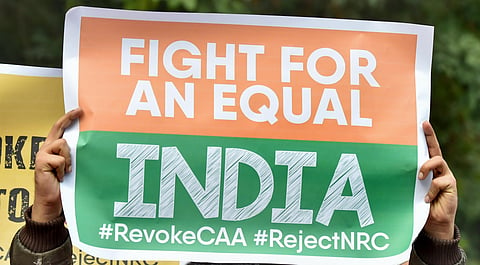

NEW DELHI: The Ministry of External Affairs Ministry on Friday said that dual citizenship is not permitted as per the provisions of the Citizenship Act (CAA).
Replying to a question in the Lok Sabha on the number of citizens of other countries given Indian citizenship after the implementation of the Citizenship Amendment Act (CAA), the Minister of State for External Affairs V. Muraleedharan said that it is not granted under Article 9 of the Constitution of India read with Section 9 of Citizenship Act, 1955.
To a question on whether national security has been threatened due to dual citizenship, the minister said that the CAA has come into force on 10 January 2020, and persons covered by the Amendment Act can submit applications for grant of Indian citizenship after appropriate rules are notified by the Central Government.
The Citizenship (Amendment) Act, 2019, aims to facilitate the grant of citizenship to migrants belonging to Hindu, Sikh, Buddhist, Jain, Parsi, and Christian communities from Afghanistan, Pakistan, and Bangladesh and have entered India on or before 31, December 2014.
Jaishankar said that CAA is applicable to citizens, who have been exempted from the penal provisions of the Foreigners Act, 1946 and the Passport (Entry into India) Act, 1920, and the rules or orders made thereunder by amending the Passport (Entry into India) Rules 1950 and the Foreigners Order, 1948 vide notifications dated 07, September 2015 and 18, July 2016.
On the question on the number of foreign citizens living in the country, he said that there is no accurate estimate of the total number.
CAA likely to be implemented by December: Bengal BJP MLA
The Citizenship Amendment Act (CAA) is likely to be implemented by December, West Bengal BJP MLA Asim Sarkar claimed on Friday.
Sarkar, the chairman of the BJP's refugee cell in West Bengal, said the CAA needs to be rolled out in the state to meet the aspirations of the people.
"Being the head of the state refugee cell, I have the hunch that the Citizenship Amendment Act (CAA) will finally come into force by this December. The process will start to set the drive in motion by that time," he told reporters.
"The CAA needs to be rolled out in West Bengal to meet the aspirations of the people, particularly Hindu refugees in bordering districts," he added.
Sarkar, the MLA of Haringhata in Nadia district, had earlier said the discontentment among Hindu refugees from Bangladesh would never be addressed if the CAA is not implemented before the 2024 Lok Sabha elections.
The Trinamool Congress said that Chief Minister Mamata Banerjee will never allow CAA to be implemented in the state.
"People like Asim Sarkar are trying to mislead migrants, including the backward Matua community, by making such false claims," state Forest Minister Jyotipriyo Mallick told PTI.
Those who voted in the previous elections are bonafide citizens of the country, he said.
"Not only in West Bengal, CAA cannot be implemented anywhere in the country. There are 300 cases related to CAA pending in court. Asim Sarkar and leaders of his ilk should desist from such false claims with an eye on vote bank," Mallick said.
Earlier this week, Union Home Minister Amit Shah assured leader of opposition in West Bengal assembly Suvendu Adhikari that rules regarding the CAA will be framed after the Covid precaution dose vaccination exercise is over.
The framing of rules for the CAA will pave the way for its implementation.
Passed by Parliament in December 2019, the Act is yet to be rolled out due to the absence of rules.
The government has cited the outbreak of the pandemic for not framing them so far.
The CAA seeks to provide Indian citizenship to Hindus, Jains, Christians, Sikhs, Buddhists and Parsis entering India on or before December 31, 2014 from Bangladesh, Pakistan and Afghanistan after five years of residence here.
(With PTI Inputs)